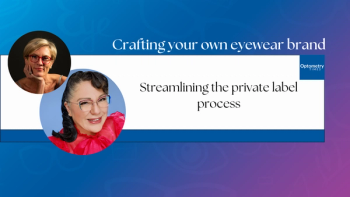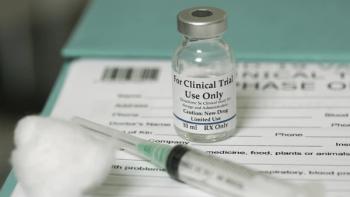
Blog: A parent's perspective on genetic testing
The views expressed here belong to the author. They do not necessarily represent the views of Optometry Times or MultiMedia Healthcare.
I lost a distant relative to ovarian cancer. As part of her treatment, she underwent a genetic screening to determine if she carried the gene related to ovarian cancer. She did, and she informed our family. At the time, the testing was prohibitively expensive, so we did not consider having it done.
In 2015, I enrolled in a local study by the HudsonAlpha Institute for Biotechnology to be genetically screened for breast cancer genes. I learned I carried the BRACA2 gene.
Given that I had been blessed with my son and twin girls and had already endured three years of biopsies, mammograms, and ultrasounds, I elected to proceed with surgical intervention. My family members were also tested, and all proved to be negative. I am the only one with the BRACA2 gene, inherited from my father’s side of the family.
Previously by Dr. Swartz:
My husband’s side of the family also carries hereditary diseases, including severe Alzheimer’s disease and Charcot-Marie-Tooth disease, the most commonly inherited form of peripheral neuropathy.
Knowing your children may have inherited not one but several diseases from your genetic makeup is a heavy burden. It is one I intended to avoid dealing with for some time.
I had planned to pursue my children’s genetic testing for the BRACA2 gene at my genetic counselor’s recommended age of 26. Whether the results are positive or negative for a gene mutation, genetic testing has potential benefits.
Related: Understanding genetic testing for hereditary disease
Genetic testing
Obtaining genetic results can provide a sense of relief from uncertainty when you have a family history of certain diseases and help with making informed decisions about your own health. Lifestyle changes can be made based upon results. Certain life events may be preplanned knowing assistance may be likely required later in life. In some cases, doctors will recommend surgery to avoid the disease altogether.
In my case, I underwent an oophorectomy, a bilateral mastectomy, and reconstruction to avoid ovarian and breast cancer.
While I had planned to delay investigation into our genetic minefield for a decade, modern medicine had other ideas. I have one child recently diagnosed with a connective tissue disorder.
After five years of seeing specialists without a definitive diagnosis, it was a rheumatologist who determined my daughter’s gastrointestinal (GI) challenges were not related to the inside of the GI system but rather her connective tissues. Her twin suffers from repeated ankle injuries and will (un)happily report she is currently on her 12th cast in three years. The surgeon cannot explain the repeated ligament tears and stress fractures and has recommended genetic testing to investigate the underlying etiology.
Also by Dr. Swartz:
So I am currently standing on the top of the stairs looking warily downward, not wanting to know the information I am about to obtain about my family’s genetic blueprints. Knowing this information may end my daughter’s amateur cheerleading career-but enable her to avoid further injury-makes sense. Nonetheless, I told her surgeon to put a pin in that discussion because-let’s face it-once a cheerleader, always a cheerleader.
Genetic predispositions also open a can of worms that no teen should need to deal with among AP exams, prom, and driver’s education.
Parental consideration
I ask all ODs to consider this when discussing genetic testing with patients. The DNA tests currently available allow patients to submit their information to other databases to learn more about their genes.
For example, you can submit a sample to “23andMe,” and then submit DNA information to additional databases to identify nutritional guidance, fitness guidance, medication metabolization information, allergy and skin condition reports, cancer genes, and methylation reports.
You can learn if you have one (or more) of 550 inherited health conditions that could be passed to your children. (Silly me, concerned with my three possibilities, when there could be 550.) There is actually a website for “genetic life hacks.”
Related:
My concern is that obtaining this information without guidance from a healthcare provider or genetic counselor could be devastating. I do not feel it should be taken lightly, and I definitely do not feel a person’s DNA information should be “hacked” in any way.
When an OD is determining whether to refer a patient for testing, take into account the following:
1. Do your homework to determine the best place to refer patients to obtain the testing you require. Not all testing can be found locally. For example, Hudson Alpha tests only for certain cancers and medication metabolism. University genetic departments may be the best option when screening for more rare diagnoses.
2. Investigate genetic testing options where the staff is knowledgeable and available for support. Although it may be cheaper to have testing done via 23andMe, no one is there to answer specific questions for those investigating clinical conditions or syndromes, and information may be misinterpreted.
3. Prepare patients for the emotional side of knowing what they may be at risk for developing. This is less of a concern for a 30-year-old learning she may have macular degeneration. It is more of a problem for early-onset dementia or certain types of cancers.
4. Consider the cost and insurance reimbursement of testing. Be upfront about it. If you do not discuss it, patients will later. They may decide to pursue a cheaper, less supportive option over the internet.
5. Insurance coverage can be challenging when testing positive for certain conditions. Long-term care insurance and life insurance may not be available if results place patients in a high-risk category. Medical insurance may also be affected for those with high-risk status.
Getting genetic data is like ordering a computed tomography (CT) scan; You may find information on the scan you did not plan for and that you unknowingly shared it with family members.
Related:
Many genetic diseases are being investigated by the National Human Genome Research Institute (NHGRI). More information on areas of research can be found on the
The science is easy to process-the emotional component is not, according to Rajani Aatre, MS, MSc, a genetic counselor at the University of Michigan Frankel Cardiovascular Center,
“Let’s say you find out your kid got something because you passed it down. No matter how much you intellectualize it, you can’t ever discount that the feeling of responsibility or guilt won’t affect you,” Dr. Aatre says.
But there is power in knowledge, she says in the article: It allows recipients to be proactive about their own health - and to help determine if other family members are at risk.
Read more blogs here
Newsletter
Want more insights like this? Subscribe to Optometry Times and get clinical pearls and practice tips delivered straight to your inbox.














































.png)


